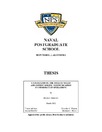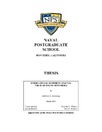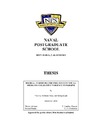MEASURING SENTIMENT RESPONSE TO COLLECTIVE VIOLENCE THROUGH SOCIAL MEDIA
| dc.contributor.advisor | Warren, Timothy C. | |
| dc.contributor.author | Crain, Michael H. | |
| dc.contributor.author | Selph, Gregory R. | |
| dc.contributor.author | Anderson, Andrew | |
| dc.date.accessioned | 2019-02-13T22:47:14Z | |
| dc.date.available | 2019-02-13T22:47:14Z | |
| dc.date.issued | 2018-12 | |
| dc.identifier.uri | https://hdl.handle.net/10945/61269 | |
| dc.description.abstract | The rise in the popularity of social media platforms along with the increased global access to communication technologies presents a unique opportunity to study the interaction between violence and the sentiment of social media users. With the availability of vast amounts of open-source data, through mediums such as Twitter, this study examines the effects of civil conflict between state and non-state actors on the sentiment of Twitter users in the countries of Nigeria, Pakistan, and the Philippines from August 1, 2013, to July 31, 2014. With the continued rise of the megacity, a focus area of this study examines the expressed sentiment within the megacities of Lagos, Karachi, and Manila and analyzes how this can be used to predict sentiment expressed in the rest of the country. From this research, we conclude that collective violence produces emotionally charged sentiment within social media toward both the state and non-state actors across various types of civil conflict. Furthermore, we find that this polarizing sentiment varies among the ethnic groups present in each country. This research also concludes that the sentiments expressed in a megacity can serve as a useful predictor of sentiments expressed throughout the rest of the country. | en_US |
| dc.description.uri | http://archive.org/details/measuringsentime1094561269 | |
| dc.publisher | Monterey, CA; Naval Postgraduate School | en_US |
| dc.rights | This publication is a work of the U.S. Government as defined in Title 17, United States Code, Section 101. Copyright protection is not available for this work in the United States. | en_US |
| dc.rights | Copyright is reserved by the copyright owner. | en_US |
| dc.title | MEASURING SENTIMENT RESPONSE TO COLLECTIVE VIOLENCE THROUGH SOCIAL MEDIA | en_US |
| dc.type | Thesis | en_US |
| dc.contributor.secondreader | Cunningham, Daniel T. | |
| dc.contributor.department | Defense Analysis (DA) | |
| dc.contributor.department | Defense Analysis (DA) | |
| dc.contributor.department | Defense Analysis (DA) | |
| dc.subject.author | sentiment analysis | en_US |
| dc.subject.author | en_US | |
| dc.subject.author | violence | en_US |
| dc.subject.author | social media | en_US |
| dc.subject.author | social media analysis | en_US |
| dc.subject.author | megacities | en_US |
| dc.subject.author | Lagos | en_US |
| dc.subject.author | Manilla | en_US |
| dc.subject.author | Karachi | en_US |
| dc.subject.author | Nigeria | en_US |
| dc.subject.author | Pakistan | en_US |
| dc.subject.author | Philippines | en_US |
| dc.description.service | Major, United States Army | en_US |
| dc.description.service | Major, United States Army | en_US |
| dc.description.service | Major, Army, Canada | en_US |
| etd.thesisdegree.name | Master of Science in Information Strategy and Political Warfare | en_US |
| etd.thesisdegree.name | Master of Science in Information Strategy and Political Warfare | en_US |
| etd.thesisdegree.name | Master of Science in Defense Analysis (Irregular Warfare) | en_US |
| etd.thesisdegree.level | Masters | en_US |
| etd.thesisdegree.level | Masters | en_US |
| etd.thesisdegree.level | Masters | en_US |
| etd.thesisdegree.discipline | Information Strategy and Political Warfare | en_US |
| etd.thesisdegree.discipline | Information Strategy and Political Warfare | en_US |
| etd.thesisdegree.discipline | Defense Analysis (Irregular Warfare) | en_US |
| etd.thesisdegree.grantor | Naval Postgraduate School | en_US |
| dc.identifier.thesisid | 32321 | |
| dc.description.distributionstatement | Approved for public release; distribution is unlimited. |
Files in this item
This item appears in the following Collection(s)
-
1. Thesis and Dissertation Collection, all items
Publicly releasable NPS Theses, Dissertations, MBA Professional Reports, Joint Applied Projects, Systems Engineering Project Reports and other NPS degree-earning written works.





